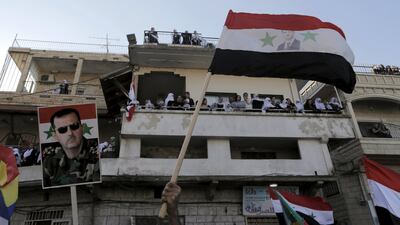The catastrophe of the Syrian civil war has been measured in broken bodies and shattered lives. Millions have left Syria, perhaps four million, and millions more are internally displaced. That is in addition to the quarter of a million civilians who have been killed by the war.
Now a British think tank has sought to quantify the economic cost of the war. In a report released this week, Chatham House estimated that the Syrian economy shrank by more than half since the start of the civil war, and that the currency, the Syrian pound, has lost 80 per cent of its value.
Life everywhere in Syria is difficult. Even in Damascus, the last city where something resembling normal life exists, prices have skyrocketed and the value of salaries has collapsed. The price of the civil war is felt on the dinner tables of every Syrian family.
What the report doesn’t quantify is the cost of lost trade, the opportunity cost of losing four years of economic growth. Syria’s was never a model economy, but, in the years after Hafez Al Assad died in 2000, there was an economic opening. The doctrine of self-sufficiency was eased and foreign companies entered the Syrian market. The economy grew, even if the spoils were not evenly shared. In 2010, the year before the uprising began, the IMF estimated Syria’s inflation at 4 per cent; today it is running above 50 per cent.
But the civil war in Syria has not just impacted that country’s economy. It has affected neighbouring countries as well – Lebanon, Jordan and Turkey have experienced a cooling effect because of the war next door. In Lebanon and Jordan, two countries that have absorbed enormous numbers of Syrian refugees, the resultant boost in the economy as a result of refugees renting apartments and spending money cannot compensate for the effect on a war next door. Smuggling is now common, as the regime in Damascus seeks to find ways to get its goods out of the country, and can no longer rely on its usual border crossings: the one into Jordan is closed and the area is controlled by the Syrian rebels, while ISIL controls the Iraqi side of the Syria-Iraq border.
The idea, once loudly trumpeted, of a Mediterranean free trade zone lies in tatters. Syria was not part of the original plan, but Jordan, Egypt and Lebanon were; today, the euro-Med zone is barely discussed. (It was meant to be finished by 2010.) The war in Syria has cost so many lives inside the country and has cost the livelihoods of so many more beyond its borders.

